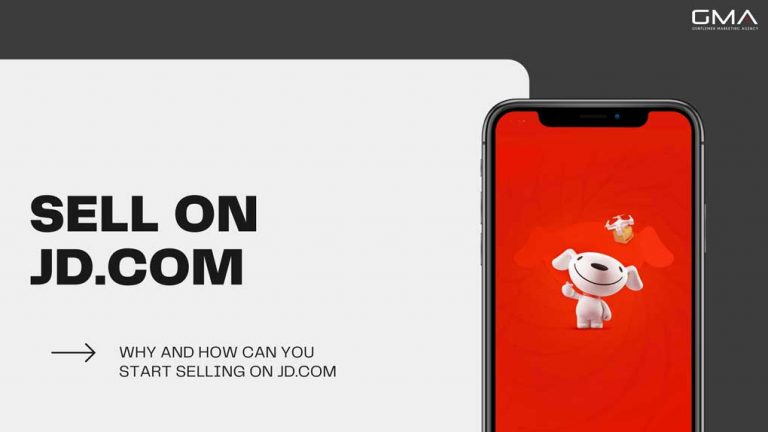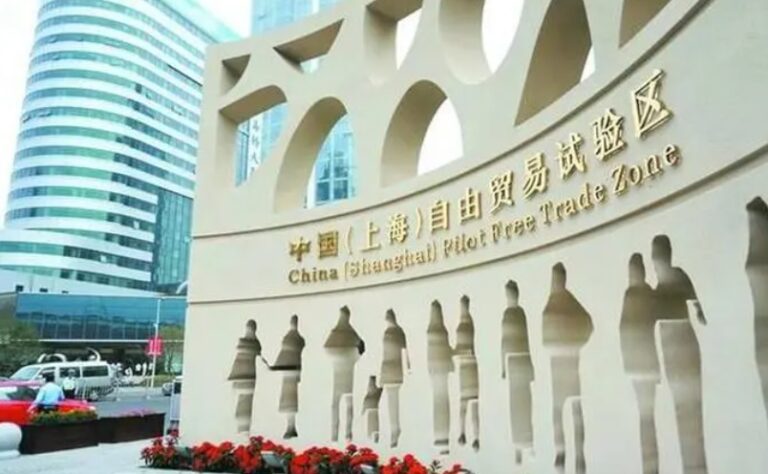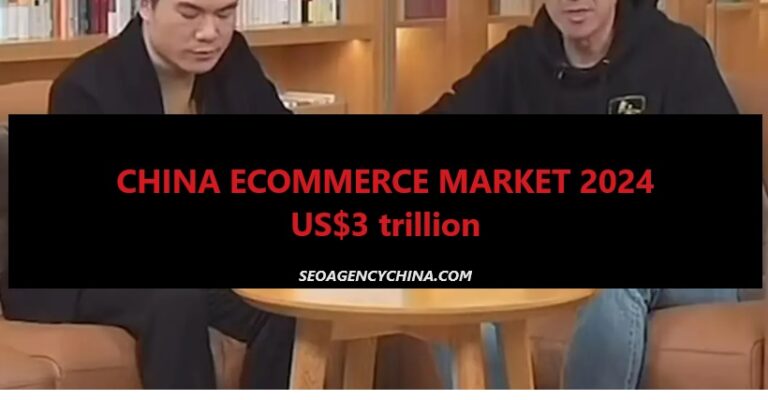Tmall Global: Connect to Chinese Consumers with Cross-Border E-Commerce

The vast majority of Chinese shoppers are online. In fact, 91% of internet users in China buy goods and services from the comfort of their homes. It is also one of the fastest-growing eCommerce markets in the world, with $453 billion worth of goods sold online in 2018 alone.
Tmall Global is a Chinese cross-border e-commerce online marketplace (Alibaba Group) that allows brands to sell directly to Chinese consumers at a low cost without having to open up an entirely new company or warehouse overseas. If you are interested in selling on Tmall Global, this guide will show you how! This blog post will teach you all about how to start selling on Tmall global, as well as some helpful tips for launching your products there!
Cost-Effective Agency
KPI and Results focused. We are the most visible Marketing Agency for China. Not because of huge spending but because of our SMART Strategies. Let us help you with: E-Commerce, Search Engine Optimization, Advertising, Weibo, WeChat, WeChat Store & PR.
Why do you need to compete in the Chinese e-commerce market?
China shoppers purchase more online through diverse digital ecosystems. By March 2020, there were more than 710 million online shoppers. As of 2021, the penetration rate of China’s digital buyers reached 57% which makes China the second-largest e-tailing market after the U.S. In 2020, the mobile payment rate was over 86% among mobile internet users.
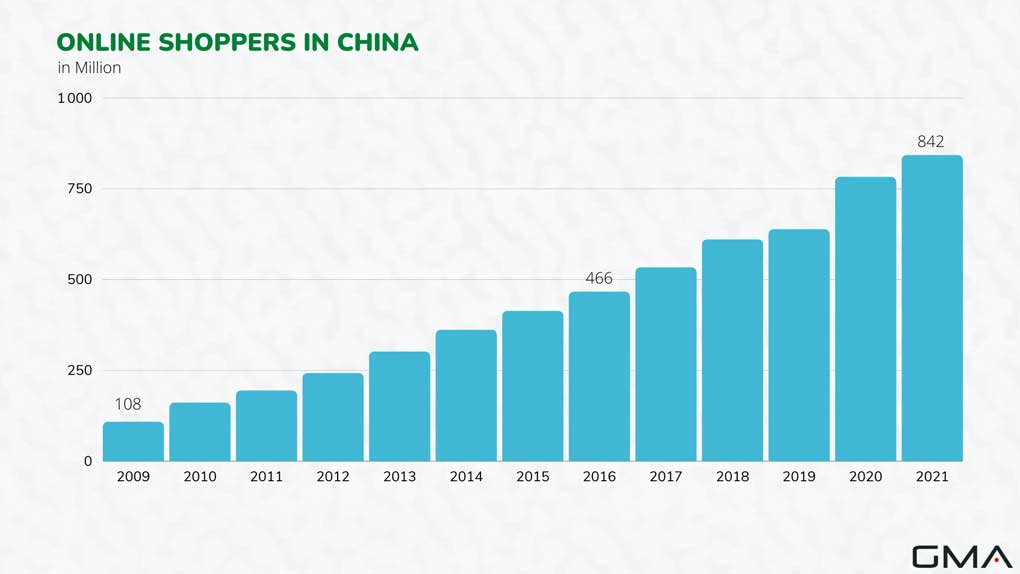
Plus, there is a popular marketplace-focused business model in China. Single-category shopping malls can be easily found in China, such street-style products. Chinese online shoppers go to categorized marketplaces when they search online from Tmall, Taobao, and JD (Tmall closest competitor). For instance, there are sections in Tmall categorized as beauty and skin care, baby care, nutrition and healthcare, food and beverage, clothes and bags, etc.

More importantly, compared to e-retailers specializing in overseas products, Chinese buyers trust Chinese cross borders platforms such as Kaola, Suning, or Tmall Global more.
In contrast with buying from an individual seller who has no reviews or ratings upon which they can rely for guidance on the authenticity of goods being sold, customers feel much better about purchasing directly through one company’s services rather than dealing with unknown (or known) brands over a distance internet connection while also not having access to reliable information.
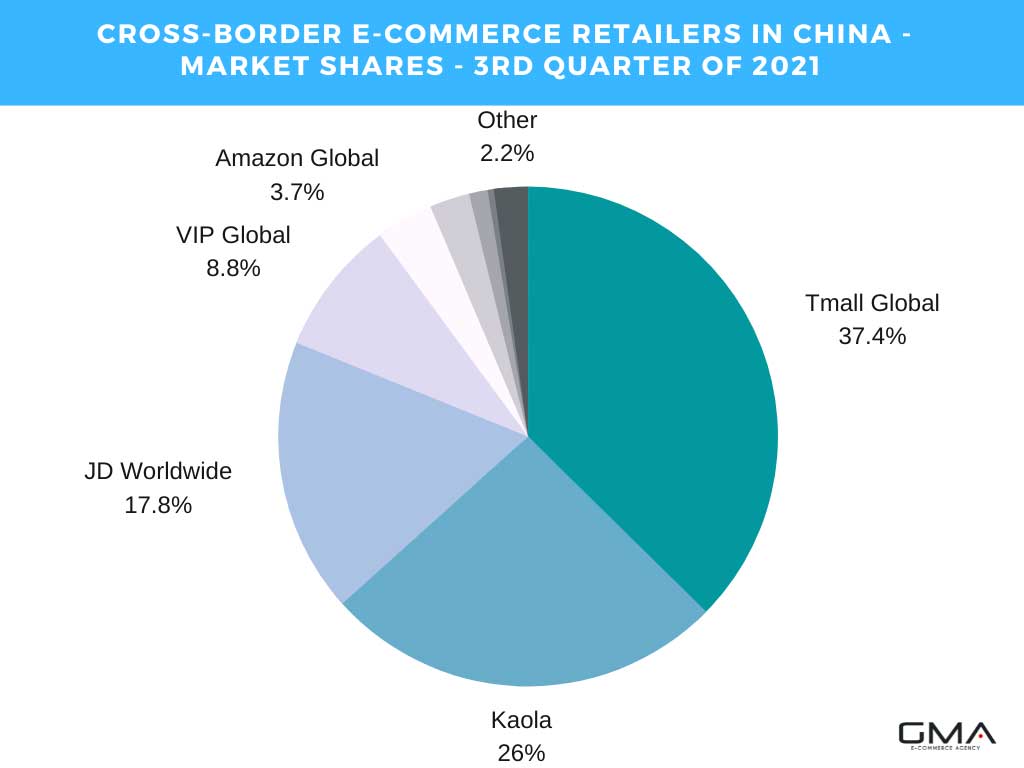
Making a purchase through a marketplace such as Tmall Global is not only a safety net for consumers but also a lot more convenient as they have already all their information registered on the app and do not need to go through the process of ID/Address checks and can simply pay with Alipay/ payment option is an important point that is not mentioned enough.
Many retailers that sell to China only have a credit card option for instance, but credit card is not the norm in China, and without offering alternatives such as Alipay or WeChat pay, these marketplaces are losing potential customers.
But enough with the intro, you are here, it is to learn more about Tmall & Tmall Global
Tmall vs Tmall Global, which one is right for your brand?
When it comes to making your choice between Tmall & Tmall Global, you need to answer the following questions:
- What are your goals?
- Are you ready to invest in having a legal presence in China or not?
Let’s dig a little more into the two versions of the 2 platforms and see what are their pros and cons, and under what conditions you should consider one or the other.
Tmall: China’s biggest Local eCommerce Platform
Tmall is an online retail platform for B2C (business-to-consumer) products, operated in China by Alibaba Group. Alibaba is a company specializing in e-commerce, retail, Internet, and technology. It owns China’s largest C2C (customer-to-customer) platform, Taobao, and Alipay, China’s largest e-payment platform (54.4%). It owns its cloud computing platform, Aliyun, and AliExpress helping deliver Chinese products to foreign countries. It’s available to both Chinese and international businesses.
Tmall is the leading China B2C e-commerce retailer with the largest gross merchandise volume (GMV) and generated about 6.6 trillion yuan transaction volume in 2020 (annual sales). However, only companies that have a physical entity on the Chinese market (and a Chinese business license) can register in Tmall. For other businesses, Tmall’s sub-platform, Tmall Global, is the default option. Users can access Tmall Global via both the Tmall and Taobao mobile apps.

When Brands should you go with Tmall?
Do you want to make it big and have access to hundreds of millions of potential customers? Tmall has more traffic and transactions than Tmall Global.
If your goal is to enter the China Market at some point, go directly through Tmall. Getting a business license and official entity in the country is not as complicated as it seems and the fees on both Tmall and Tmall Global as well as entry requirements are pretty high. A brand that already has a legal entity in China, should obviously go for Tmall.
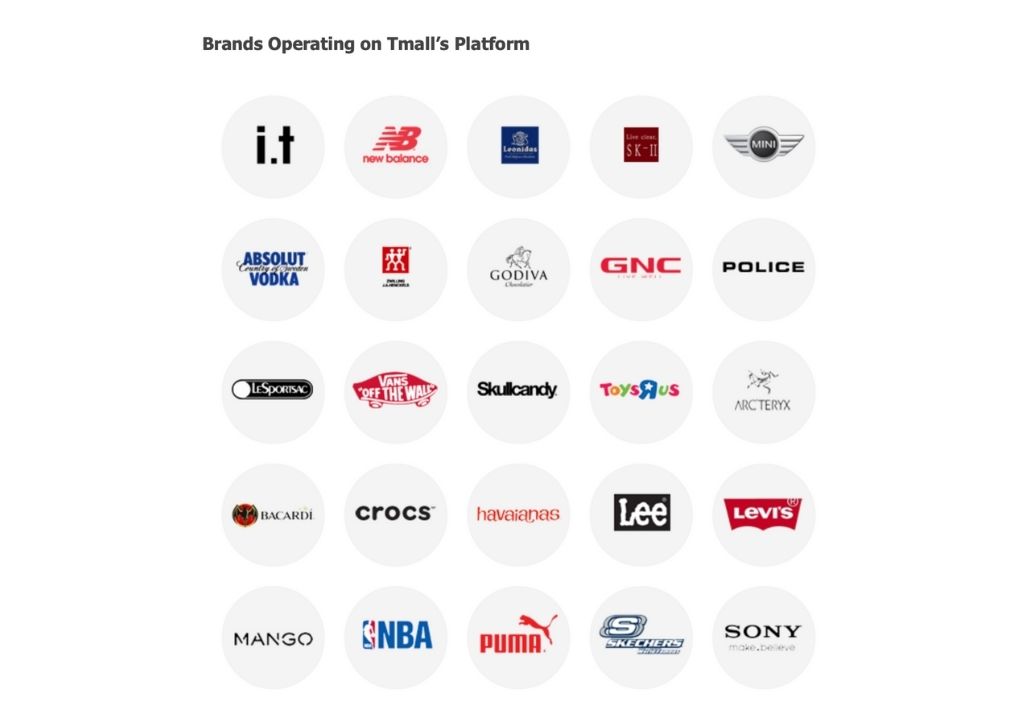
Tmall stores require more document procedures and on-site assets to invest in but can benefit from the fast shipping, as 46% of Tmall users prefer express shipping. Returns and shipment will be more complex for Tmall Global stores if you do not have goods in stock in Mainland China, but less risk considering the investment in a store.
Cross border e-commerce with Tmall Global
Launched in 2014 by Alibaba, a foreign-business friendly platform -“Tmall Global” allows non-local companies to sell products to consumers in China without the need for local licenses or permits. Foreign brands can also select their own warehouse and home bank accounts instead of a Chinese bank account when selling on Tmall.
Chinese e-commerce giant Alibaba acquired the second-largest cross-border e-commerce shopping platform Kaola in 2019. Next year, Alibaba’s Tmall Global is the leading provider of online import shops, with a 63.3% market share.
When should brand you go with Tmall Global?
The biggest pro of selling on Alibaba’s Tmall Global is obviously not having to apply for a Chinese business license. Another one is, that sellers pay fewer taxes when using cross-border e-Commerce in China.

The con? Each cross-border e-commerce consumer is limited to a yearly spending amount (around, 3000US$). This means that the consumer’s base (which is already smaller than with local eCommerce), is also limited in how much it buys on cross-border brands on all platforms combined. If you want to play big, cross-border may not be the right option for you.
However, if you are simply looking to test the waters while not going through the process of registering your company in China, then Tmall Global is the way to go.
Some regulations to products selling on Tmall Global
- Provide a certificate of origin for every product
- Product information label in Chinese
- Being able to offer delivery within 72 hours after the order was placed
- Approval by Tmall and Mainland China customs (Chinese product regulations CCC, CIQ)
- Merchant’s foreign license
NB: most brands on the marketplace had annual sales over $10 million prior to being invited to become a merchant.
Open a store on Tmall Global (TMG)
Tmall Global Store is ideal for building brand awareness and introducing new products. Stores can be self-managed or operated by a third-party TP.
- Submit product descriptions and information for verification and register an international Alipay account
- Choose the store types
Types of Stores Available
- Franchise Stores (Merchants): Allows overseas merchants to sell brand-licensed goods from a certain brand or multiple sub-brands.
- Flagship stores (Brands owner): a Flagship store allows brands, holding a trademark certificate certifying their ownership, to be the store owner. For instance, Sephora Flagship store.
- Specialty Stores: International Merchants can sell products with distribution rights authorized brands, and sell goods without geographical restrictions in China.
Or, partner with an agent and sell your product in their existing store, and pay the transaction cost per sold goods.
Tmall Global Service and Commission fee
- Security deposit: $25,000. It will be refunded after closing the store.
- Fixed yearly fee: charged based on the product category between $5,000 to $10,000 per year. Pay the highest amount for selling various categories.
- Commission: charged according to order value, and varies from 2% to 4% depends on categories. Commission Fee = XX% x (Product Price + Freight Cost)
- Service fee: charged due to the Alipay processing, 1% service fee.
Other business models
Except for opening a store on Tmall Global for brand management, the other two business models TOF (Tmall Overseas Fulfillment) and TDI (Tmall Direct Import) can be considered product-oriented solutions.
The overseas fulfillment is a recent addition and was created to increase the cross-border marketplace to increase its attractiveness with mid-size foreign merchants while keeping a strict grip on who can or can not sell on their online store. Brands will be able to use the app overseas bonded warehouses through Cainiao. Alibaba’s bonded warehouses are working with more than 30K brands in over 90 countries in the world.
Tmall Direct import is more akin to a distribution model for imported products.
Who are Tmall Customers?
The composition of customers in the marketplace is 50% male and 50% female. They are between the ages of 25 and 34 (34%) and followed by the 35-44 age group (28%). China’s Gen Z is set to become the biggest consumer group of the app. Indeed, the percentage of shoppers born after 2000 using the app has exploded, with growth at 70% from 2020 to 2021; Young consumers have an increased appetite for imported goods and better trust in online stores and overseas vendors than previous generations.
What products do Chinese consumers tend to purchase on Tmall?
In terms of product categories, Health, fitness, and sports are fairing well with the app’s customers. Electronic devices and technology international brands interest them as well, as 47% of customers like to follow up on new technology.

Major International Brands on Tmall Global
Increasing brand lists bring more luxury product choices to the marketplace such as Alexander Wang, Prada, Cartier, and Isabel Marant. Christina Fontana, the director of fashion and luxury at Alibaba Europe, claimed that Tmall is China’s leading customer engagement platform, from its content curation to its range of international brands.

Which Products categories are a good fit for Tmall Global?
As shown in the survey report, Food (55%), Cosmetics (49%), Shoes, Bags & Fashion (48%) were purchased the most in cross-border e-Commerce during 2017-2018. Chinese customers tend to value foreign brands in health, beauty, and baby care categories with a belief in higher quality(67%).
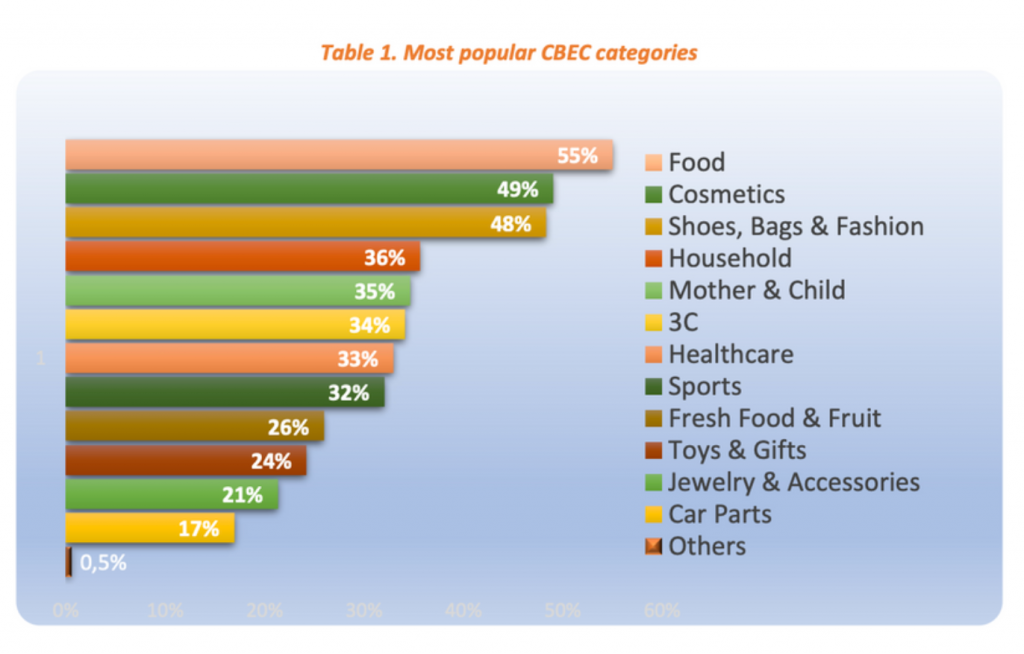
Why Do Some Brands are both Tmall and Tmall Global?
To maximize the profits and maintain brand images, some larger-scale businesses sell bestsellers on Tmall (Tmall Classic, etc.) and new or niche products on Tmall Global.
An algorithm personalizes a consumer’s page on Tmall based on previous shopping choices, while also comparing promotions and calculating the best discount prices.
Marketing Strategies on Tmall and its Global version?
How Advertising Tmall Global Works
Choose the advertising methods according to your budget, paid advertising on Tmall Global can be a pricey option.
- Keyword ads display on the search results page – Zhitongche enables the keyword ad on Tmall. How does it work? Similar to google ads: When users enter a keyword in the Tmall search bar, Ads will be displayed on the search results page, how high they appear there depends on bidding.
- Super recommendation ads automatically recommend products to users based on their experience and preference on Tmall. Thus, new brands or similar products can be specifically pushed to specific targets
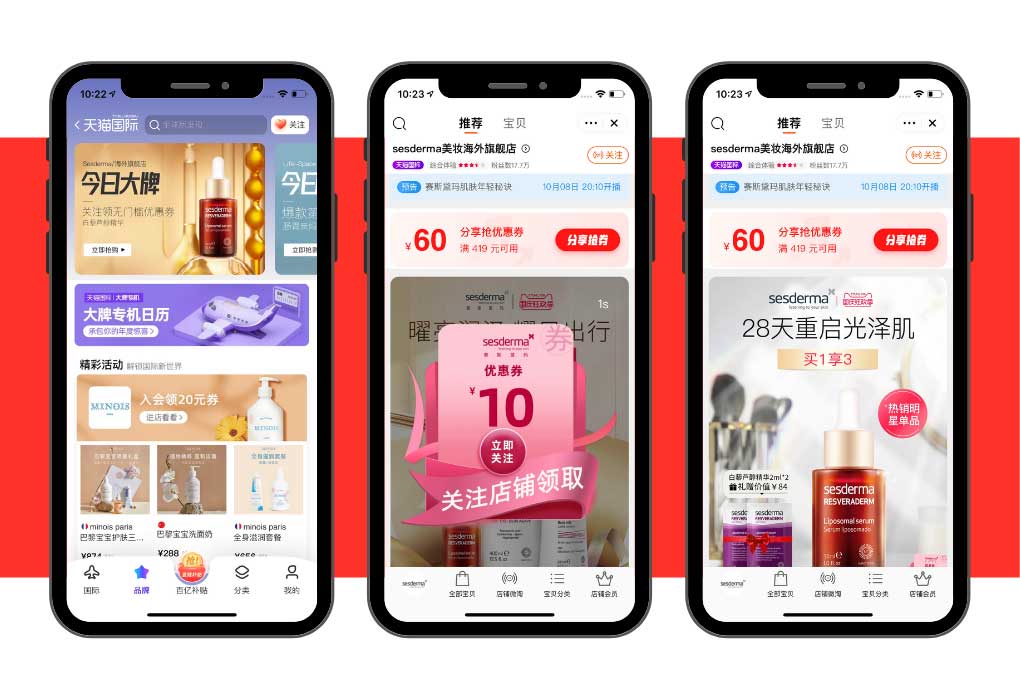
- Banner ads show up in the most visible place on the top of the home page and are some of the priciest types of Tmall Ads, but it also reaches a wider range of customers. Banner Ads can be displayed with pictures, videos, and links to your product page or store.
- Juhuasuan聚划算 is an integrated section displayed on the homepage of Tmall. Provided discount is available for a limited time which attracts users to purchase fast, or functions as a flash sale linking users to land on the specific product page.
- Tmall “SEO” is significant enough for a brand to put resources in. Tmall “SEO”, is the art of having your products “rank” high on Tmall search requests. To rank higher in product searching you’ll need rich and relevant product descriptions, quality pictures, a good conversion rate, a low product return rate, etc. The more you sell, the more positive reviews you get, and the more visibility the Tmall algorithm will give you.
2. Driving external traffic to your Tmall Global Flagship store
Target similar customers or a wide range of viewers through advertising on social media or search engines such as Weibo, Douyin, and Baidu to link back to your Tmall store or the product page. Combine the previous techniques with Kols marketing to consolidate your online reputation in China as well as to reach out to new audiences.
Off-site marketing when selling on Tmall or Tmall Global is not only a necessity to acquire more visitors to your store at a lower cost but also to improve your conversion rate. The more positive content available on your brand online, the higher the chances are that visitors will convert with you rather than the competition.
3. Tmall official Campaigns & Shopping Festivals
In the Chinese eCommerce world, there are thematic and festival promotions every month. These shopping events with their goal of encouraging customers’ consumption can be an opportunity for brands to launch specific collections or plan customized marketing campaigns in order to generate more interest among potential buyers.
During these periods without any major sales happening anywhere else on social media networks where people’s spending habits may change irregularly due to different reasons like dieting patterns that affect credit scores etcetera.
Some major Chinese festivals are Lunar New Year, Chinese Valentine’s Day, Mother’s Day, Father’s Day, etc. Also, special campaigns such as the 8th of March (38 Women Festival), 18th of June (618 Promotion), 9th of September (99, drinks), 11th of November (Double 11, single), 12th of December (Double 12), etc.
4. Encourage customers to leave reviews
We rapidly touched on the topic earlier, but reviews are key to not only more visibility on Tmall, but also to a better conversion rate. Indeed, peer reviews have an important impact on users’ decisions to place an order or not.
Tmall customers tend to comment on posts more than the average online user. 59% of them find online customer reviews are very helpful, which means word-of-mouth, social sharing, and reputation matter.
5. Live streams and live commerce are key marketing tools in China
Seeing a product used live by trusted influencers is highly appreciated by domestic consumers. In 2019, China’s gross merchandise value of e-commerce live-streaming remained 4.5 % of the total online shopping’s GMV. It was predicted to grow to 20.3 % in 2022.
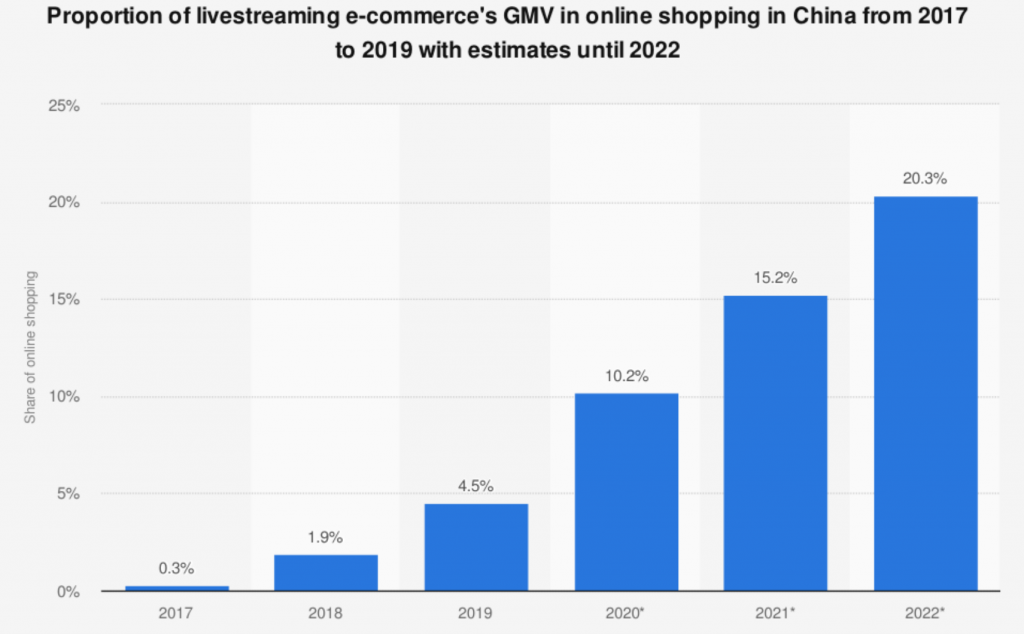
According to Statista, over a third of China’s population used live commerce and one in two of them purchased in 2019.

To Conclude on Tmall Global and Cross-Border eCommerce in China
If you haven’t yet started selling in China, one of the best ways to get a foot in the door is through cross-border eCommerce. Tmall Global is among the most popular Chinese cross-border eCommerce platform and should definitely be regarded as a solid option to start selling without having a legal Chinese entity established in China.
Start Selling on Tmall Now with the help of a certified TP

As an experienced certified Tmall Partner, GMA can help you register on Tmall global as well as provide you with professional services such as localization, Chinese language customer support, advertising, and so on.
We make sure you enter China e-commerce market successfully: increase your sales, and drive traffic to your store, with cost-efficiency in our mind.
Contact us today, so we can discuss how we might be able to work together with your company!



